What is Demerol?
Meperidine is used to ease moderate to severe pain. It works by altering the way the brain and nervous system respond to pain. Meperidine (Rx) Brand and other names are Demerol, Pethidine, Isonipecaine. Moreover, it is also called meperidine hydrochloride. Unfortunately, meperidine may be habit-forming, especially with prolonged use. Therefore, your healthcare provider may advise you to undergo a Demerol detox to wean off the drug safely if you have developed a dependency or prescription drug addiction or substance abuse, as it may cause withdrawal symptoms.
Demerol belongs to a class of drugs called Synthetic Opioids, Opioid Analgesics. According to the National Institute of Health [1], in 2018, about 11.4 million people used narcotic pain relievers such as Demerol without a prescription. Demerol can cause physical dependence. This means that a person relies on the drug to prevent withdrawal symptoms. Over time, more of the drug is needed for the same effect. This is called drug tolerance. Taking it more often than needed or in higher doses than prescribed may lead to addiction requiring Demerol detox.
Demerol tablets and oral solutions expose users to the risks of opioid addiction, abuse, and misuse, leading to overdose and death. Therefore, your doctor must assess each of your risks before prescribing DEMEROL Tablets or Oral solutions and monitor you regularly to check if there’s any development of these behaviors and conditions.
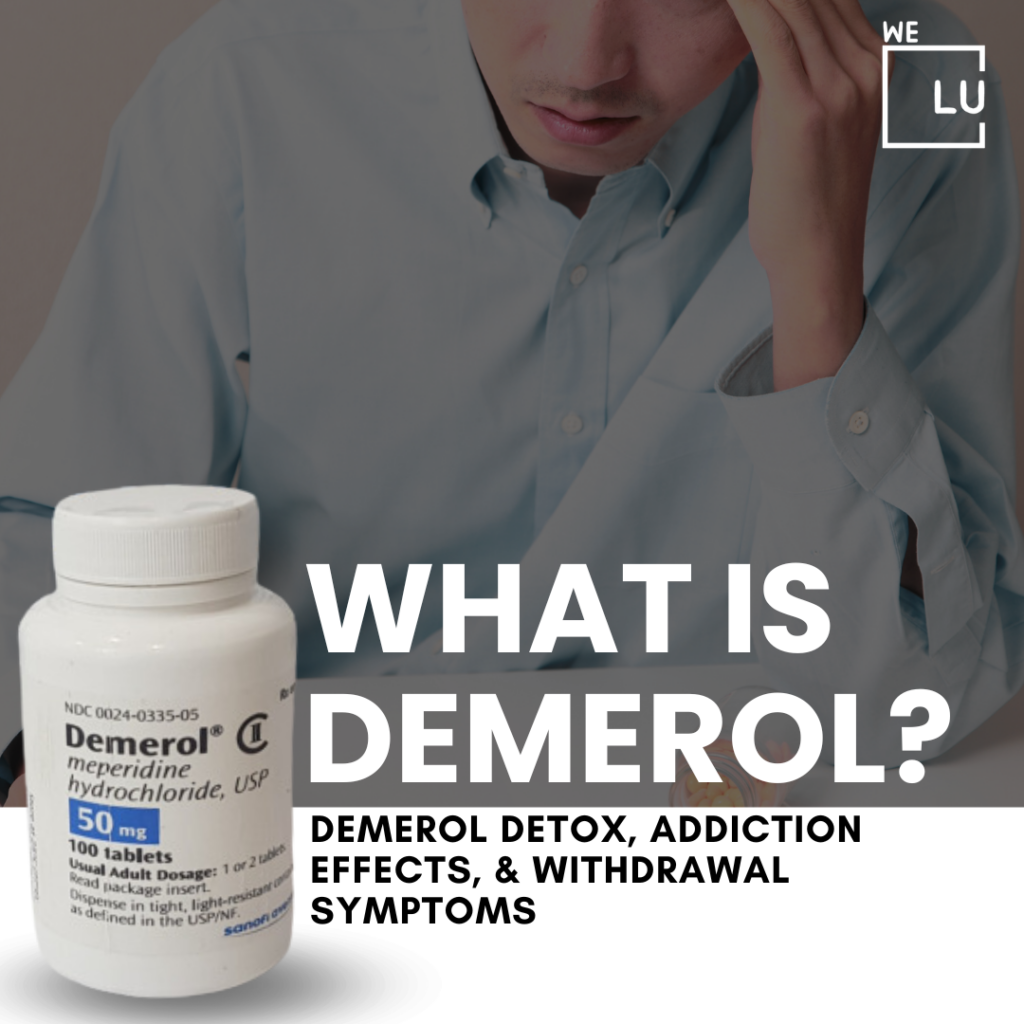
Demerol Side Effects
Meperidine may provoke side effects so, it’s best to consult with a medical doctor if any of these symptoms are severe or do not go away:
- Lightheadedness
- Dizziness
- Weakness
- Headache
- Extreme Calm
- Mood Changes
- Nausea
- Vomiting
- Stomach Pain or Cramps
- Constipation
- Dry Mouth
- Flushing
- Sweating
- Changes in Vision
Some side effects can be harsh because of the drug potency. The following symptoms are rare, but if you encounter any of them or those listed in the IMPORTANT WARNING section of the drug package, seek help immediately: [2]
- Sweating
- Confusion
- Fast Heartbeat
- Shivering
- Severe Muscle Stiffness or Twitching
- Loss of Coordination
- Nausea
- Vomiting
- Diarrhea
- Nausea
- Loss of Appetite
- Weakness
- Inability to get or keep an erection
- Irregular Menstruation
- Decreased Sexual Desire
- Slow or Difficult Breathing
- Shaking hands that you cannot control
- Seizures
- Difficulty Urinating
- Fainting
- Rash
- Hives
Overdose Symptoms may include the following:
- Slow or Shallow Breathing
- Difficulty Breathing
- Extreme Sleepiness
- Unable to Respond or Wake Up
- Loose, Floppy Muscles
- Cold, Clammy Skin
- Slow Heartbeat
- Nausea
- Blurred Vision
- Dizziness
- Fainting
Access to Naloxone for Opioid Overdose
To avoid the risk of a life-threatening opioid overdose [3], a medical doctor that you consult with should assess the need for naloxone upon initiating and renewing treatment if you need to. Basically, they should also consider prescribing naloxone based on:
- The client’s risk factors for overdose (e.g., concomitant use of CNS depressants, a history of an opioid use disorder, prior opioid overdose)
- Household members (including children) or other close contacts at risk for accidental ingestion or overdose
You May Consult the Following with a Medical Doctor or Caregiver:
- Availability of naloxone for emergency treatment of opioid overdose
- Ways differ on how to obtain naloxone as permitted by individual state dispensing and prescribing requirements or guidelines (e.g., by prescription, directly from a pharmacist, as part of a community-based program)
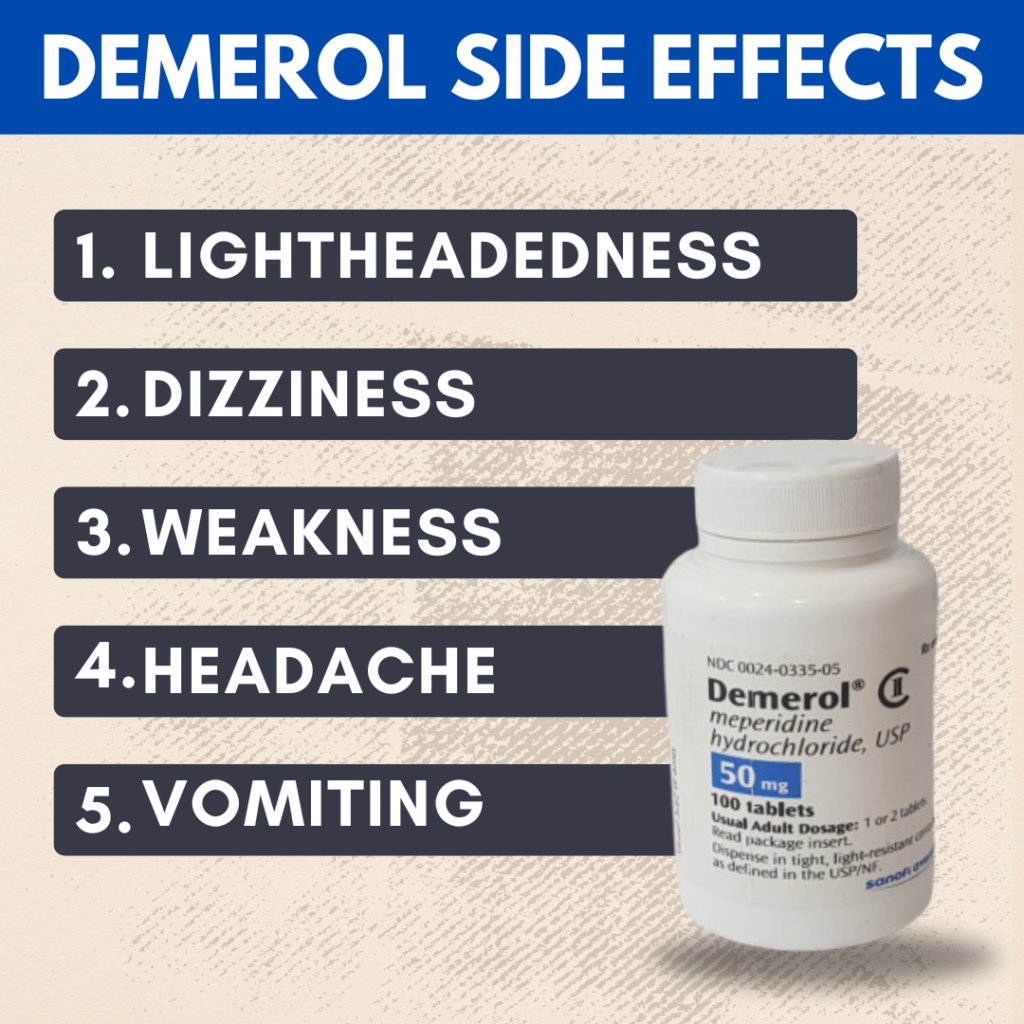
Demerol Detox & Withdrawal
If you are no longer drawn to treating your pain, you should consult your doctor on ending Demerol treatment and available alternatives. To emphasize, you should never adjust your dosage levels or treatment schedule without medical approval. Basically, this means you should never abruptly stop taking Demerol because this can produce distressing withdrawal symptoms. Typically, doctors will gradually lower a patient’s Demerol dose to give the body sufficient time to adjust to less and less medication.
Withdrawal happens when a physically or psychologically dependent individual stops taking the drug or reduces the amount they take. As their body tries to adjust physiologically to no longer having Demerol in its system, the user will experience unpleasant withdrawal symptoms, such as anxiety and agitation.
What Are Common Demerol Withdrawal Symptoms?
Demerol users may also experience strong cravings when they first quit the drug, prompting some to begin using again. To reduce the likelihood of relapse, those who are addicted to Demerol should seek the help of a medically-assisted Demerol detox program.
Demerol detox withdrawal symptoms are typically moderate to severe and can include the following:
- Anxiety
- Paranoia
- Agitation
- Insomnia
- Restlessness
- Nausea
- Seizures
- Vomiting
- Runny nose and eyes
- Shortness of breath
- Muscle aches
- Sweating
- Chills
- Dry mouth
- Increased blood pressure
Demerol Withdrawal Timeline & Symptom Durations
There are two phases of withdrawal that a user will experience during Demerol detox. These are acute withdrawal and post-acute withdrawal symptoms. The acute withdrawal is the first phase and usually occurs during the 3rd and 10th day of your last Demerol dose while the PAWS lasts longer, in some cases as long as 24 months, but the symptoms eventually fade as time passes by [4].
Timeline Stages
First 24 Hours
This is where irritating symptoms arise such as anxiety, nausea, physical discomfort, and irritability. You may also feel very strong urges which, if not properly addressed, could lead to relapse.
Days 2-5
Expect your Demerol detox withdrawal symptoms to worsen. Some common symptoms that manifest during this phase are nausea, vomiting, nausea, sweating, and muscle aches.
Days 6-14
The withdrawal symptoms are fading. The remaining symptoms are not that painful. PAWS is expected to begin during this phase.
Days 15-onwards
Other symptoms such as depression, mood swings, restlessness, inability to feel pleasure, poor concentration, decreased appetite, agitation, anxiety, lack of motivation and insomnia fade away. The urge to take the drug again may still persist.
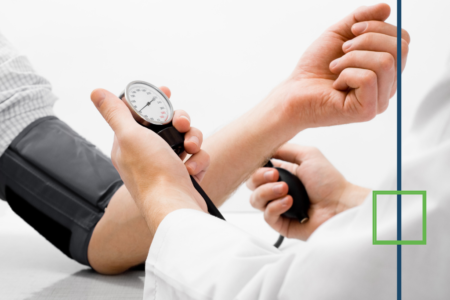
Managing Withdrawal Symptoms of Demerol
Withdrawal from these drugs on your own can be very hard and may be dangerous. Treatment most often involves medications, counseling, and support. You and your provider will discuss your care and treatment goals.
MEDICATIONS
Methadone relieves withdrawal symptoms and helps with detox. It is also used as a long-term maintenance medicine for opioid dependence. After a period of maintenance, the dose may be decreased slowly over a long time. This helps reduce the intensity of withdrawal symptoms. Some people stay on methadone for years.
Buprenorphine (Subutex) treats withdrawal from opiates, and it can shorten the length of detox. It may also be used for long-term maintenance, like methadone. Buprenorphine may be combined with Naloxone (Bunavail, Suboxone, Zubsolv), which helps prevent dependence and misuse.
Clonidine is used to help reduce anxiety, agitation, muscle aches, sweating, runny nose, and cramping. It does not help reduce cravings.
Other medicines can:
- Treat vomiting and diarrhea
- Help with sleep
Naltrexone can help prevent relapse. It is available in pill form or as an injection. It also, however, can bring about a sudden and severe withdrawal if taken while opioids are still in your system.
People who go through withdrawal over and over should be treated with long-term methadone or buprenorphine maintenance.
Anyone going through detox for opiates should be checked for depression and other mental illnesses. Treating these disorders can reduce the risk for relapse. Antidepressant medicines should be given as needed. [5]
Demerol Detox Infographics
The infographic below provides information about Demerol withdrawal, including the strong cravings that users may experience when they first quit the drug, leading some to relapse. To minimize the risk of relapse, individuals addicted to Demerol should consider seeking assistance from a medically-assisted Demerol detox program.
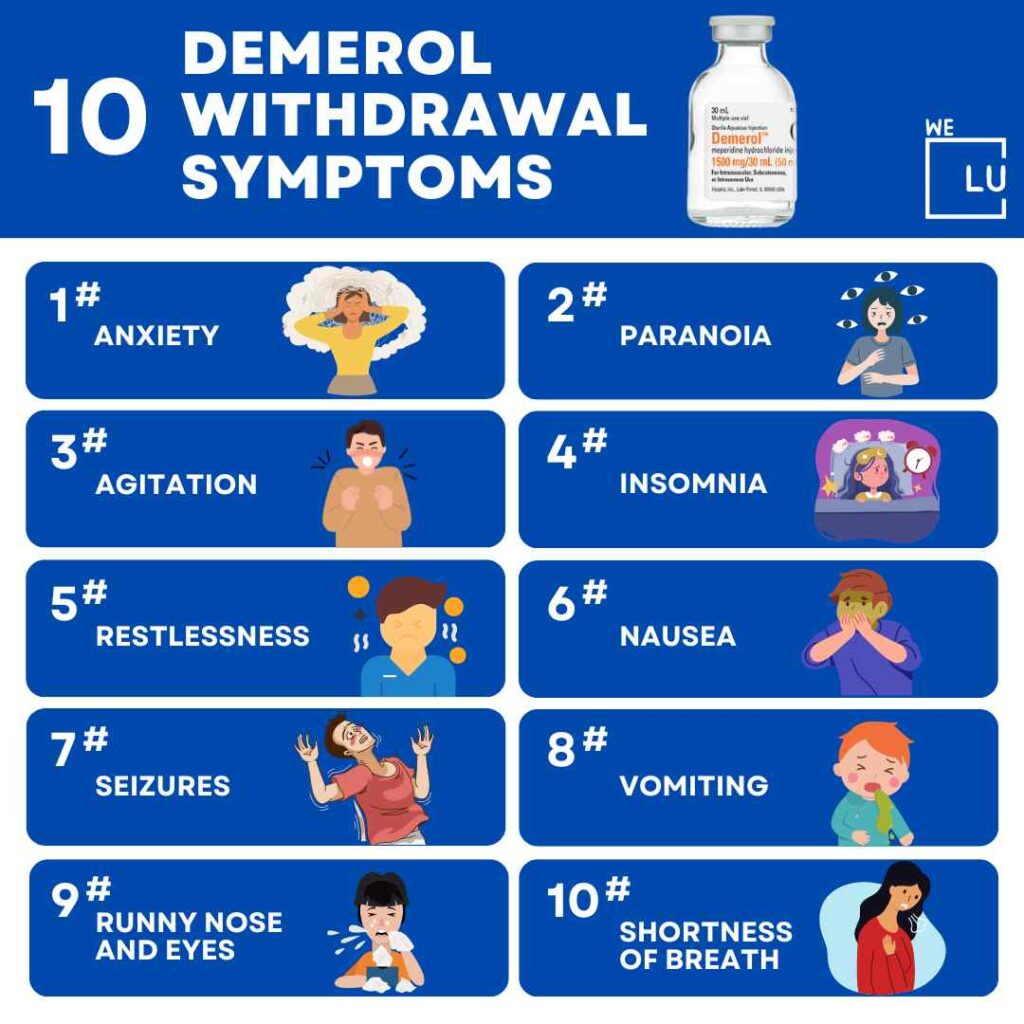
Embed the above “10 Demerol Withdrawal Symptoms” Infographic to your Website. This infographic is provided by the We Level Up Addiction Treatment Center team. To use the above infographics, you agree to link back and attribute its source and owner at https://weleveluptx.com/demerol-detox/
10 Demerol Withdrawal Symptoms image link: https://weleveluptx.com/wp-content/uploads/2024/02/10-Demerol-Withdrawal-Symptoms-Demerol-Detox-What-is-Demerol-Demerol-Side-Effects-Demerol-Detox-Withdrawal-Demerol-Detox-Treatment-1024×1024.jpg
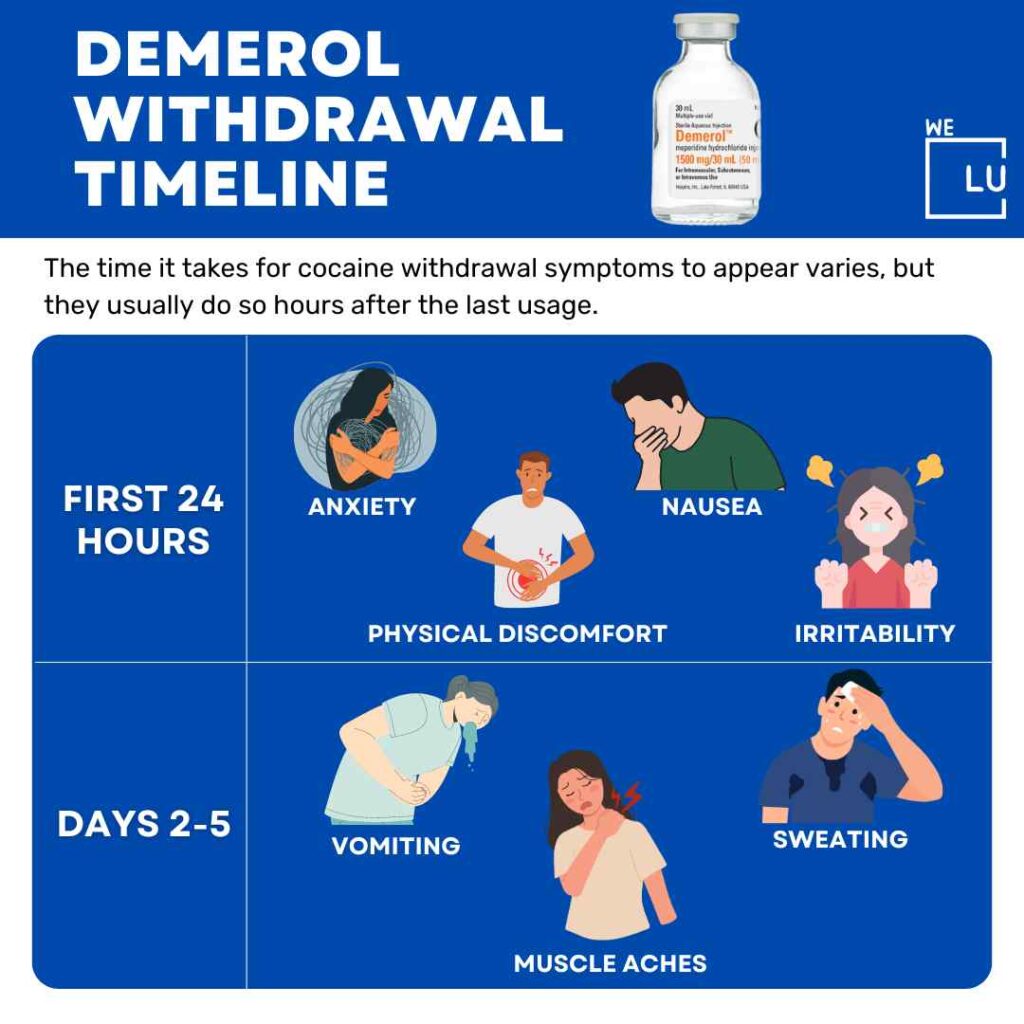
Embed the above “Demerol Withdrawal Timeline 1” Infographic to your Website. This infographic is provided by the We Level Up Addiction Treatment Center team. To use the above infographics, you agree to link back and attribute its source and owner at https://weleveluptx.com/demerol-detox/
Demerol Withdrawal Timeline 1 image link: https://weleveluptx.com/wp-content/uploads/2024/02/Demerol-Withdrawal-Timeline-1-Demerol-Detox-What-is-Demerol-Demerol-Side-Effects-Demerol-Detox-Withdrawal-Demerol-Detox-Treatment-1024×1024.jpg
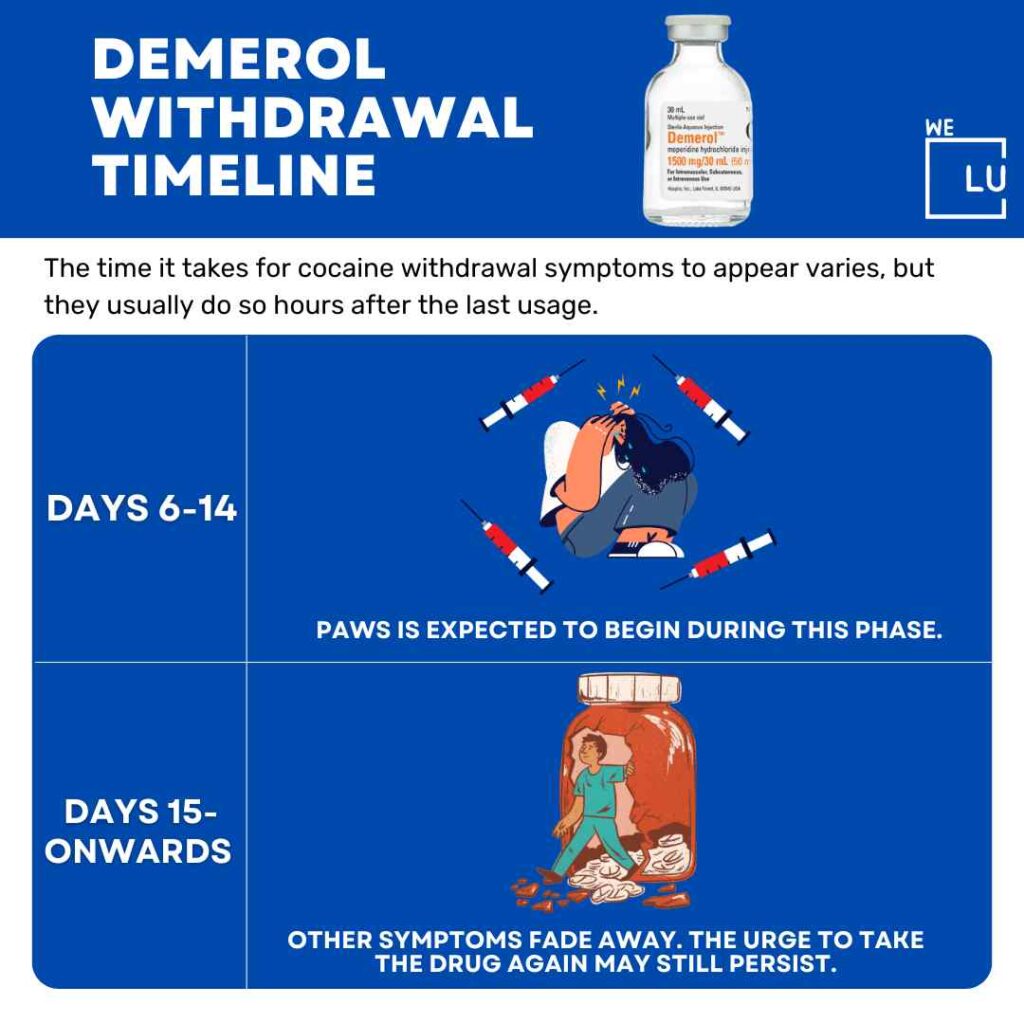
Embed the above “Demerol Withdrawal Timeline 2” Infographic to your Website. This infographic is provided by the We Level Up Addiction Treatment Center team. To use the above infographics, you agree to link back and attribute its source and owner at https://weleveluptx.com/demerol-detox/
Demerol Withdrawal Timeline 2 image link: https://weleveluptx.com/wp-content/uploads/2024/02/Demerol-Withdrawal-Timeline-2-Demerol-Detox-What-is-Demerol-Demerol-Side-Effects-Demerol-Detox-Withdrawal-Demerol-Detox-Treatment-1024×1024.jpg
Demerol Detox Treatment
An approximated seventy-five percent of individuals who abuse heroin started taking prescription opioids, highlighting the dangers of prescriptions. When you look at these factors, you begin to realize that treatment for Demerol addiction is crucial. Moreover, opioid addiction has been the leading cause of drug overdose in many users.
The first step in the continuum of care for Demerol addiction is medically-assisted Demerol detox. Because withdrawal symptoms vary for each person but are distressing in general, medically-assisted Demerol detox is the best process to discontinue the drug. Given that, Demerol detox is an around-the-clock outlet that will help you wean off the substance safely under the guidance of medical professionals.
Demerol Detox & Medications
Demerol detox is much like detoxing off other drugs. Your clinician will determine the best way to wean the body off its dependence on the drug in a gradual, phased approach. You may be prescribed medications to help reduce the severity of withdrawal symptoms, and a nurse will monitor your progress and make adjustments to your medications as needed. You may also be given NAD+ IV treatments to help boost cellular regeneration, further reduce withdrawal symptoms, and kick-start the recovery process. [6]
During medically- assisted Demerol detox, doctors may taper off your dose of Demerol over a period of weeks. However, it is more common to switch to another, a similar substance, such as Buprenorphine, Suboxone, or Subutex. Either method helps you to reduce withdrawal symptoms and is safer and more comfortable than quitting “cold turkey.” Sometimes, a physician will prescribe you medications to help with the withdrawal process.
Demerol users are advised to consult a doctor before quitting the drug if they have a prescription. Demerol users who do not have a prescription are advised to get an evaluation of whether they should complete withdrawal in a medically-assisted Demerol detox program.
Prolonged abuse of Demerol can cause abnormalities and changes in your brain. When these changes occur, it means that you have become reliant on Demerol—you have developed a tolerance, dependence, or even an addiction. Even those who follow a prescription can become dependent on Demerol as well.

If you are ready to face your Demerol addiction and turn your life around, We Level Up TX treatment center can help you. We offer excellent Demerol detox and treatment programs developed by our dedicated and well-trained professionals to help you recover in the safest and most comfortable way. Time to put your addiction behind you, call us today.
Sources:
[1,5] Opiate and opioid withdrawal – National Institutes of Health
[2] Meperidine – National Institutes of Health
[3] Commonly Used Drugs Charts – National Institute on Drug Abuse
[4] Detoxification and Substance Abuse Treatment – Substance Abuse and Mental Health Service Administration
[6] We Level Up » Treatment » Demerol Detox